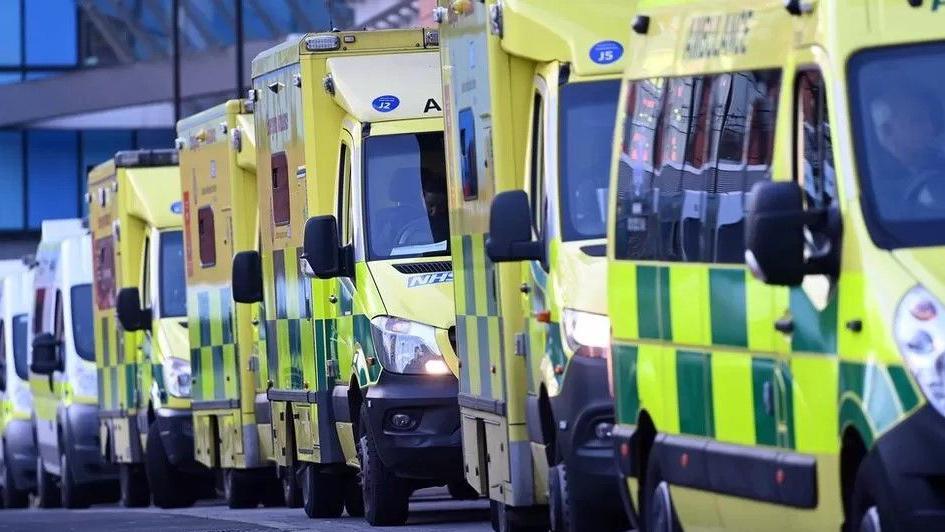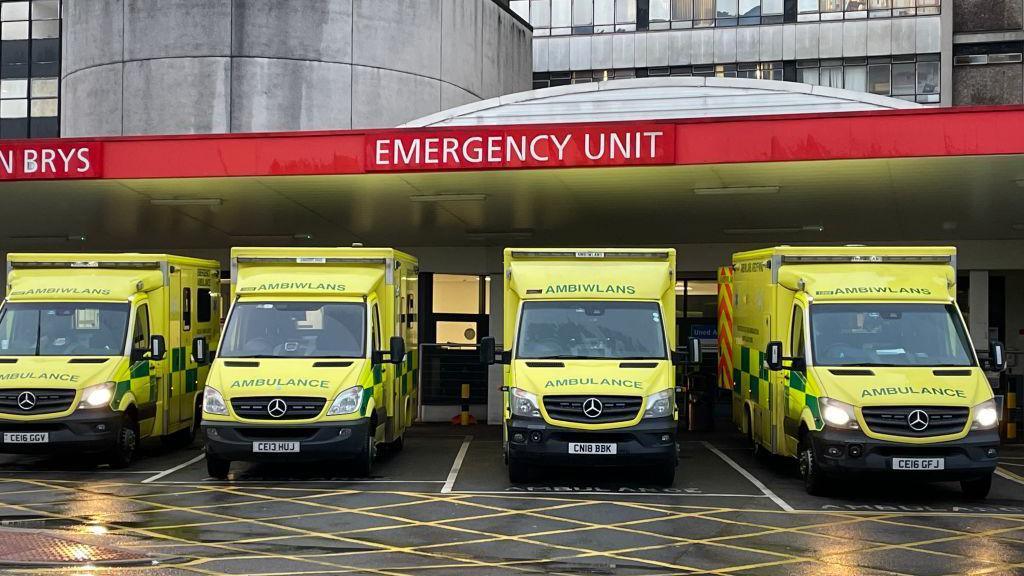Drop in ambulance waits outside A&E

There was a marked improvement in ambulance response times
- Published
There has been a big reduction in ambulance handover delays at Welsh hospital emergency departments in the last month.
Two hospitals in particular have seen dramatic falls in the hours lost by crews waiting for A&E staff to take over the care of patients.
In total across Wales in June there were 14,855 "lost hours", where crews waited longer than the target of 15 minutes to hand over patients and respond to fresh 999 calls.
Over the last year the figure has typically been around a third higher than that, and has reached as high as 26,000 lost hours.
Volunteer 999 responders part of ambulance service overhaul
- Published30 June
Ambulance delays harm hundreds monthly, boss says
- Published18 June
A national taskforce has been set up in an attempt to tackle the long term problem across Wales.
Health Secretary Jeremy Miles said: "Today's figures show that our focus on improving ambulance patient handover performance is working, with handover times in June the lowest since September 2021.
"With improvements in same-day emergency care and patient flow in place, significant progress is being made in most areas of Wales."
The waits in both Cwm Taf Morgannwg and Swansea Bay health boards have drastically reduced in the last month.
They fell from nearly 2,000 hours to just over 600 in Cwm Taf Morgannwg, and from nearly 2,500 to just under 800 in Swansea Bay.
The waits have consistently been flagged as an issue by Welsh Ambulance Service bosses, as those delays impact the ability of paramedics to respond to fresh calls coming in to 999.
While 50.7% of red calls received an emergency response within eight minutes, this number grew by just 0.7% in June.
In July, the measures for ambulance response times were changed in an effort to improve survival rates from out-of-hospital cardiac arrests in Wales, and those will be published for the first time in August.
'Disappointing'
Elsewhere the latest NHS performance figures were disappointing.
In May there was an increase in the number of patients waiting to start treatment - it now stands at just over 796,100, which is an increase of around 6,200 from the previous month.
Those waiting more than two years went up by 6.5% on the previous month, to just under 10,300 - this is after the first minister had hoped figures would be down to around 8,000 by spring.
While reaching that rough ball park figure earlier this year, the numbers have since risen.
The numbers waiting longer than one year for their first outpatient appointment also rose to 75,500.
During May, cancer performance figures improved against the 62-day target to 61.3% - a rise of 0.8%, though still below the 75% target.
The health secretary added: "It's disappointing to see the longest waits for treatment rise after we brought them down in recent months, but they are 85% lower than the peak.
"But I am confident we will see another significant reduction next month - when we receive the end of quarter one position - based on the feedback I have received from health boards and that we will be on track in our plans to eliminate two year waits."
The Welsh NHS Confederation, external said the figures for May and June paint a "mixed picture" for the health and care system in Wales.
It pointed to the hard work of staff and leaders that had reduced handover delays, adding: "However, if we want to see whole-system improvements, we need sustained capital investment – in NHS estates and infrastructure – to boost productivity, an accelerated solution to the pressures facing our social care system and a whole-government shift towards prevention, to reduce demand in the first place and create a healthier nation.
"Without these changes, we will continue to see fluctuating performance across different parts of the health and care system."
James Evans, Welsh Conservative health spokesman said the latest figures proved Labour's health strategy was "failing and the so-called progress they celebrated recently was just a flash in the pan".
"No one should be waiting over a year for treatment."
Plaid Cymru's health spokesman Mabon ap Gwynfor said "seeing the longest waits rise yet again will be a matter of great disappointment to the people of Wales".
"After throwing hundreds of millions at tackling waiting lists, and failing, it's clear that Labour's time is up."
Welsh Liberal Democrat leader Jane Dodds said the latest NHS performance figures were "nothing short of a damning indictment of 25 years of Labour mismanagement in Wales".
- Published7 April

- Published15 July

- Published17 July
